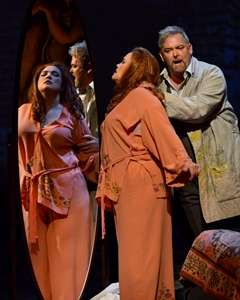|
Back
Hidden treasure unearthed Dallas
The Winspear Opera House
03/21/2014 - & March 23, 26*, 29, April 6, 2014
Erich Wolfgang Korngold: Die tote Stadt, opus 12
Jay Hunter Morris (Paul), Mardi Byers (Marie/Marietta), Morgan Smith (Fritz), Katharine Tier (Brigitta), Weston Hurt (Frank), Jennifer Chung (Juliette), Angela Turner Wilson (Lucienne), Jan Lund (Victorin), Andrew Bidlack (Albert) Tony Trahan (Gaston)
The Dallas Opera Chorus, Alexander Rom (chorus master), The Dallas Opera Orchestra, Sebastian Lang-Lessing (conductor)
Mikeal Melbye (director, scenic designer), Deirdre Clancy (costume designer), Wendall Harrington (video designer), Peter Kaczorowski (lighting designer)

M. Byers, J. H. Morris (© Karen Almond/DO)
Dallas Opera must be credited with going out on a limb as it staged this rarity, a piece once consigned to the operatic attic. It was performed at the Metropolitan Opera in the work’s glory days soon after its splashy 1920 premiere; since WW II in North America it has had just five productions prior to this one: two at the New York City Opera, and one each in Chicago (Lyric), San Francisco and Los Angeles.
The plot is simple: a man, Paul, mourns the death of his wife, Marie. He finds himself captivated by a bohemian young woman, Marietta, who looks just like her. After a period of turmoil they sleep together, but in a fit of rage Paul strangles her. He then awakens and realizes his infatuation with Marietta was just a fevered dream.
The work has its flaws. Korngold has been criticized for treading well-worn paths established by the two dominating composers of the era, namely Richard Wagner and Richard Strauss. It must be admitted that the climax of Act II, when Paul and Marietta decide to make love, contains distinct echoes of the climax to Wagner’s Siegfried, but without that work’s epochal musical and dramatic liftoff. Similarly, the music accompanying the murder of Marietta echoes that for the death of Salome in the Strauss opera. To its credit, the work does contain effective music conjuring up the atmosphere of the historic city of Bruges and the torment in Paul’s mind. There are the two truly lovely musical numbers (without which the opera would never be performed): in Act I the duet for Marietta and Paul, “Glück, das mir verblieb” (probably better known in its arrangement as a soprano aria, “Marietta’s lied”) shows us a sympathetic side to Marietta who at first comes across as flighty and crass; and, in Act II, one of Marietta’s performer friends, Fritz, sings “Mein Sehnen, Mein Wähnen”. While it is a wonderful showpiece for a baritone, it really isn’t integral to the plot.
The role of Paul is a “big sing” for the tenor and Jay Hunter Morris delivers. The role has moments of rapture when he must lighten the voice; Morris did this very nicely and one wished there were more such moments. The role of Marietta begins awkwardly from the dramatic point of view as we don’t immediately share Paul’s fascination with her. Mardi Byers was more convincing as the action progressed. She has a dramatic mane of auburn hair; had it been blond she would have resembled the talismanic portrait of the late Marie. Morgan Smith gave a rivetting account of Fritz’s aria.
Retired lead baritone Mikael Melbye demonstrates notable skill as both director and designer of the production, borrowed from Denmark’s Den Jyske Opera. His expressionistic use of projections worked marvelously well at the start of Act II when the music portrays the fevered torment in Paul’s mind. Debuting conductor Sebastian Lang-Lessing gave a riveting account of the rich score.
Following the performance there was an informative Q&A session with conductor Sebastian Lang-Lessing and Dallas Opera General Director Keith Cerny. This production was one of Dallas Opera’s policy of resurrecting “hidden treasures”. Next season: Tchaikovsky’s lush and affecting Iolanta, well worth checking out.
Michael Johnson
|